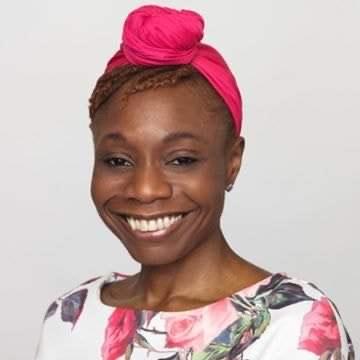For weeks after the death of George Floyd at the hands of the police, Brooklyn agent Wileen Saint Louis watched as companies across corporate America spoke out against racial injustice and promised to take a hard look at their own practices.
Missing from the conversation was her own firm, Nooklyn, a rental-focused brokerage based in Bushwick.
“The silence of this company has spoken volumes to me and has been an utter disgrace,” Saint Louis wrote on June 19 in a company-wide Slack message and mass email.
“Are we that invisible? Is this movement not worth a message?”

Wileen Saint Louis
Shortly after, her Slack message was deleted, which she and several agents interviewed by The Real Deal viewed as an effort to silence her. Moiz Malik, Nooklyn’s CEO, acknowledged deleting the message but said he later reposted it in a channel he created called “#discussion.”
Saint Louis’ criticisms prompted other agents at Nooklyn to come forward with allegations that the firm treats minority agents unequally, ignores agents’ reports about discriminatory landlords and has failed to hire Black people in senior leadership roles — a well-documented issue in boardrooms across the country.
In response, Malik pledged that he would hire a Black agent to lead diversity and inclusion efforts, develop a new system for handling complaints and phase out the company’s logo — a stylized teepee — and take other steps.
The furor at Nooklyn is one of two recent examples of conflict at residential firms over racial issues brought to TRD’s attention by whistleblowers, echoing a wider pattern across the business world. The second occurred at Core Real Estate, a boutique sales brokerage owned by Related Companies, Midtown Equities and co-founder Shaun Osher.
Core conflicts
Last December, after a Black agent resigned from Core, two executives took to a group email thread to mock her.
The incident disturbed an employee, who expressed her concerns to management at the time. Then, in June, a tipster leaked the correspondence to TRD.
“I am finally reporting this because I feel we are all in a moment, where acts like this cannot be tolerated at any firm any longer, especially against minority groups,” said the anonymous sender.
Read more


In the exchange, COO Brittley Wise and the firm’s chief business development officer, Danielle Garofalo, swapped barbs about their departed colleague.
“Damn, we will have to find another agent that smokes weed with their hordes of cats and doesn’t sell real estate,” wrote Wise, who is married to Osher, the firm’s CEO.
“I will not have you speak about that kitty Bli$$ that way!!!!” Garofalo wrote back. (“Bli$$” is the name of the agent’s cat.)
Cacy Shamsid-Deen, then a receptionist at Core’s Brooklyn office, responded shortly after.
“Good evening Brittley and Danielle,” she wrote to the executives. “I found your recent correspondence between one another to be highly unprofessional and very distasteful. Quite honestly it makes me feel uncomfortable.”
When contacted by TRD in June, Shamsid-Deen said she felt the comments referenced racial stereotypes. (White people’s use of marijuana is often portrayed as recreational and Black people’s use as criminal, as many reports and studies have documented.)
“As a Black woman — and the agent was a Black woman — it was just saddening to see… that people still have microaggressions like that and beliefs like that they’re comfortable sharing with other people,” she said in an interview. “It was directed toward Black people specifically,” she added. “It wouldn’t have been said if it was a white woman.”
Microaggressions are commonplace verbal or behavioral actions that, irrespective of intention, convey prejudice or hostility towards marginalized groups. Last month, prominent Black real estate executives spoke out about the prevalence of such behavior within the industry.
My values, when I choose to work at a company — [it] doesn’t include racism.
Core disputed that its executives’ remarks had anything to do with race. The firm said Wise and Garofalo were referring to details they believed to be true about their former agent’s workplace behavior and personal life. Core acknowledged it had no “concrete proof” that the agent smoked marijuana, then offered three conflicting accounts in an effort to explain its executives’ comments. Eventually, Elizabeth Kee, who led the team the agent was on at Core, said in a statement that her team member often used a vape pen in the office, which Kee believed had been prescribed by a doctor. The agent was never approached about the issue before the group email was sent.
In fact, the former agent, Shalinthia Miles, only heard about Wise and Garofalo’s emails when contacted by TRD in June. She said the executives’ comments, and Core’s allegation, which she denied, didn’t surprise her.
“They’re calling my CBD treatment ‘smoking weed’ because I’m Black,” she said, referring to her prescription cannabidiol, which is not psychoactive.

Former Core agent Shalinthia Miles
“Do people REALLY believe that Shaun Osher would tolerate an agent smoking weed in the office? Of course not, it’s absurd. Core’s response is typical of what they do,” Miles added in a later text. A real estate agent since 2013, Miles joined Core last June after nearly six years at Stribling & Associates, according to her LinkedIn page.
Miles explained that she quit Core in December because she felt uncomfortable with how Core advised her to work with her clients, who are predominantly Black. She cited an incident in the weeks after she left the firm in which another Core broker, representing a buyer, aggressively pursued a Black seller whom Miles was representing with a lower-than-ask cash offer, even though the property had been taken off the market.
“My Core experience was defined by dollar-driven cronyism and clandestine racism,” Miles said.
She now works as an independent agent. Core called her account “unfair and false,” as did Kee.
Shamsid-Deen, the receptionist, left Core two months after the December email exchange. She remains bothered by the way the company responded to her complaint.
Shamsid-Deen said that Wise apologized and thanked her for calling out the exchange. However, Garofalo replied that Shamsid-Deen wasn’t aware of what prompted their emails about Miles, according to Shamsid-Deen, who added that a later phone call with her manager left her with the impression that Core wanted to ensure the incident would “not get them in trouble.”
“It kinda just seemed like ‘Are you over it?’ That’s the vibe I got,” she said. “It didn’t seem genuine.” Core denies that any conversation occurred.
“My values, when I choose to work at a company — [it] doesn’t include racism,” she said.
Core said it was not aware that the December emails had influenced Shamsid-Deen’s decision to resign, and pointed to a generic, four-sentence resignation letter in which she said she had a “very rewarding” experience.
The brokerage said it “prides itself on providing a welcoming atmosphere for every single one of our employees … Diversity and inclusion are foundational values for our team and we live by that every single day.”
Then, on the Monday before this story was published, Osher sent out an email blast to people in the real estate industry, decrying journalists who “pretend to care about truth,” and vowing that “if publications don’t stop acting recklessly they will feel it where it hurts most.”
Walk the walk
When the Black Lives Matter protests sparked a global conversation about racism and change, Saint Louis said she could not believe that Nooklyn, which brands itself as progressive and diverse, had not reached out to staff.
It felt like you were on your own and these behaviors were going to be tolerated.
“If there’s a carnival on Eastern Parkway for Labor Day, we know,” she said. “So why is it that this big world movement that’s going on, there’s nothing said about it whatsoever?”
Malik, the firm’s CEO, acknowledged the company should have spoken out. “I think that’s fair,” he said of Saint Louis’ comments. “It’s not enough to feel it, you have to say more.”
Two days after Saint Louis’ email, Malik wrote to agents and expressed regret about “not making public and company-wide statements.” He also vowed to lead a cultural shift at the firm.
Interviews with current and former agents and staff, as well as a review of internal emails from agents and management, show that many believe the lack of response was part of a pattern of neglecting to address racial disparities.
Jasmine Barros, who formerly worked in the finance department at Nooklyn and is Black, said she made multiple complaints about racist comments she heard at the office, but no action was taken.
“If three partners in the company are neglecting to act, everyone else sort of agrees to it,” she said. “It felt like you were on your own and these behaviors were going to be tolerated.”

Former Nooklyn staffer Jasmine Barros
Barros, who was let go in 2018, said Black agents were treated differently by management and not given training to help them thrive in the company.
“You would see the average Black agent making significantly less than the white agents,” she added, referring to their commission splits.
Malik acknowledged managers had “prioritized growth” over establishing processes for dealing with complaints — an issue they were now addressing.
Asked about pay inequity, he said he needed to drill down into numbers to get a fuller understanding, but said his “brain is telling me that’s not true” because many of the firm’s top agents were nonwhite.
Biased landlords
A Black agent who spoke on the condition of anonymity reported leaving Nooklyn last year because of how the firm treated minority agents — including how it handled commission splits — and how managers responded to allegations of landlord discrimination.
Last year, the New York City Commission on Human Rights, which investigates complaints and independently tests companies suspected of discrimination, received about 120 inquires related to racial discrimination in housing. The year before, it received 145.
The former agent claimed that some landlords actively seek out white renters, and by working with them, Nooklyn furthered “the displacement of brown and Black people.”
“Agents know that with certain buildings, certain landlords, you can’t bring Black people here,” the agent said.
Eric Harms, an agent at Nooklyn, said he routinely witnessed unequal treatment from landlords when he submitted applications from Black renters. In two recent cases, both applicants had high incomes and strong credit scores, he said, but the landlords reviewing their applications kept asking for more paperwork — in one instance, seven years’ of tax returns.
In contrast, Harms said he saw many white applicants with “terrible credit, terrible transaction history getting approved — no problem.”
Harms said some agents had even gone to the extent of lightening photos of Black applicants, or leaving the photograph out altogether, to give their files a better chance.
After Saint Louis’ message, several agents pushed for the brokerage to take a tougher stance with landlords.
“I’m sick of my Black clients having to jump through ridiculous hoops to get approved and when I mention this to management, they just shrug their shoulders,” wrote Jorge Vega. “This needs to be addressed.”
In response, Malik last week pledged in an email to agents that the company would “begin a review of landlord accounts that do not align with our values” and “establish a procedure for submitting housing discrimination-related complaints.”
Elaborating in an interview, Malik said he would “gladly get rid of every landlord where there is a suspected case of discrimination” because “I can’t sleep at night, knowing that.” But, he added, “that’s not been my personal responsibility until the last two weeks.” (Malik, who is a co-owner of the company, took over as CEO in May but has been chairman of the board since January, according to his LinkedIn profile. His predecessor, Noble Novitzki, did not respond to an email seeking comment.)
Asked about agents altering photos, Malik said it “deeply depresses me and it’s going to be a thing that I think about every day, and how to improve.”
“Not just lip service”
In the past month, several brokerage heads, including Corcoran Group CEO Pam Liebman, have also pledged to look inward.
“Today, you have my word that we are taking a microscope to this company,” Liebman told agents in an email in June. James Whelan, president of the Real Estate Board of New York, promised tangible change, “not just lip service.”
Many industry leaders made similar pledges last year, after a Newsday investigation revealed widespread racism at residential brokerages on Long Island.
Malik said when he was considering whether to speak out this time, he had been wary of appearing hypocritical.
“I read a lot of tweets and they said, ‘Okay, all these companies are releasing Black Lives Matter statements, show me a picture of your senior-level management,’” he said. “I took that to heart because we didn’t have a Black person in that [role], and that’s what I was trying to work on, just how do we build a better system for that?”
With the task laid out, it remains to be seen whether real estate executives will take the decisive action needed. And some Black real estate executives, while cautiously optimistic, are wary.
“We’ve all been a part of a task force,” said Jim Simmons, chief executive officer of Asland Capital Partners, during a panel discussion hosted by NYU Schack last month. “We’ve all had [diversity and inclusion] discussions about issues that are either systemic to a firm or to an industry … and change has yet to be forthcoming.”
Saint Louis said that while she was angry about how her email to Nooklyn was handled, and still questions why she was excluded from the company’s subsequent conversations about making change, she is happy the dialogue happened in the first place.
“This incident showed me exactly why unity is important,” she said. “We make a difference in numbers and with our voices.”
Write to Sylvia Varnham O’Regan at so@therealdeal.com and Erin Hudson at ekh@therealdeal.com
